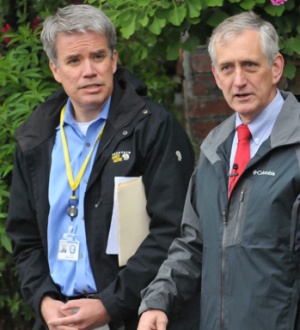
Manager and a member of the Director’s Team.
(Photo by J. Maus/BikePortland)
Two recent moves by the Portland Bureau of Transportation show that the agency wants to fix its past PR woes, tighten up its communications strategy and set a clear(er) course for the future.
On Tuesday, PBOT announced that existing media spokesperson Dylan Rivera (a former reporter at The Oregonian) would be the new Communications Manager for the bureau, overseeing a team of three staffers. They’ve also hired former Politifact reporter for The Oregonian Ryan Kost. And yesterday, the City published a request for proposals (RFP) seeking a consultant to help them create a two-year strategic plan that, “defines PBOT’s vision statement, mission statement and guiding principles.”
This is a big deal.
Anyone who has paid close attention to PBOT in the past several years knows that a major weak spot has been a lack of attention to PR and communications — two crucial ingredients for an agency whose success depends on changing the status quo.
One of the biggest debacles ever was the lack of PR strategy around former Mayor Sam Adams’ plan to front-load the Bike Plan for 2030 with $20 million from the Bureau of Environmental Services’ ‘Green Streets’ program. The idea — to coordinate construction of bike-friendly street features alongside complementary BES projects — had its merits; but it became controversial when the “sewer money for bike lanes” meme quickly saturated the local media and public dialogue. Then a few months later, PBOT rolled out buffered bike lanes on SE Holgate seemingly overnight without much warning to local residents or the press. After KATU-TV’s infamous “Bike paths to nowhere” piece aired, a revolt ensued from angry residents and PBOT found themselves mired in another quagmire of bad bike PR.
Much of the negative PR leveled at bicycling in the past few years wasn’t all due to PBOT’s lack of marketing and PR skills. Mayor Adams and his chief-of-staff-turned PBOT Director Tom Miller were lightning-rods of controversy for reasons that went way beyond bikes. But nevertheless, bikes became the political football and PBOT was usually on the losing side.
And it’s a fact that is well-known inside the Portland Building. In April 2011 then PBOT Direcor Miller said, “… recently the [transportation] bureau has suffered and consequently the perception of bicycling has suffered. A large part of this was the lack of effort the bureau has placed on communications… The bureau needs to own up to the fact that we haven’t managed communication as effectively as we needed to.”
Miller tried on two occasions to hire a top-level communications staffer, but bad politics trumped those efforts and newly-minted Mayor Hales put an end to Miller’s open PBOT public affairs job posting back in January. Then back in April, PBOT’s two former media relations staffers moved on, which set the stage for Transportation Commissioner Novick and PBOT Director Leah Treat to start fresh.
With a new mayor, a new commissioner-in-charge and new director of PBOT, Portland has the opportunity to turn the page. Right now PBOT finds themselves in a period of stagnation when it comes to moving forward with a vision for bicycling. With Dylan Rivera bumped up to a management-level position and the launch of a two-year strategic communications plan, PBOT is putting key pieces to the puzzle in place.
In a statement earlier this week, Director Treat said Rivera will become part of the PBOT Director’s Team — a team of high-level managers that before now didn’t have a communications staffer on it.
Rivera, a Reed College political science grad who hails from Austin, Texas, seems qualified for this important new role. He spent ten years as one of (in my opinion) the best reporters at The Oregonian. His coverage of transportation issues (including the Columbia River Crossing) was excellent.
The other major piece of this puzzle is the RFP that will help PBOT define their vision for the future. The agency currently lacks a cohesive, public-facing, short-term plan for how to achieve their adopted transportation goals. Our bike plan, for example, sets goals for 2030 — but what should do in the meantime to stay on track? Lack of such a plan, mixed with complacency and other factors, are major reasons why cycling has stagnated in Portland.
Here are a few salient excerpts from the RFP for a “Two-Year Work Plan”:
…the consultant will engage employees at all levels of the organization in this exercise; in essence a “vertical slice” through the organizational chart. The consultant will also engage the Commissioner in charge of Transportation, the Commissioner’s Chief of Staff, the Mayor’s Office and other key City Bureau Directors.
… The consultant will need to guide PBOT through an analysis of what processes and services it must do differently or not at all given the financial climate…
… The two year strategic plan will be a communication tool both internally and externally, so the consultant will be charged with crafting the message of how we will change focus in partnership with PBOT leadership.
With the tumultuous and controversial Adams-Miller era behind us, and a creeping complacency from years of “platinum-level” back-patting, PBOT needs a fresh start. Getting serious about a new strategic plan — and hiring the right people to help execute it — are very positive steps toward making that happen.
Stay tuned.

